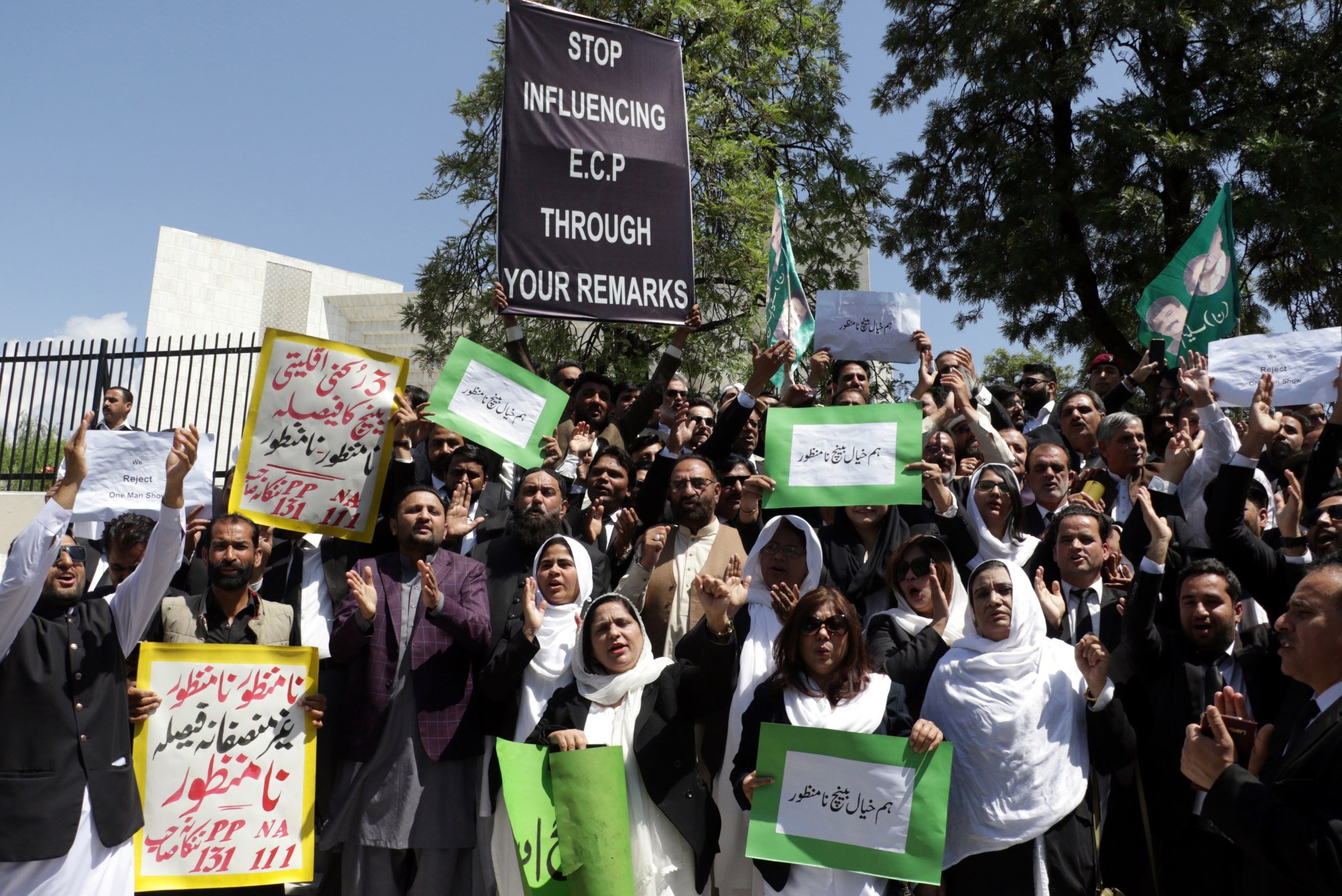
As Pakistan hurtles from crisis to crisis, military intervention rears its ugly head
- A stand-off between Pakistan’s ruling coalition and its judiciary over the date of provincial polls is threatening to become a constitutional crisis
- Officials warn the impasse could prompt the military to intervene, as instability undermines efforts to persuade the IMF to resume financial aid
Prime Minister Shehbaz Sharif’s administration has until Thursday to reach a deal with former leader Imran Khan and his Pakistan Tehreek-e-Insaf (PTI) party on provincial elections in Punjab, Pakistan’s most populous province, under a seven-day deadline Chief Justice Umar Ata Bandial issued on April 20.
But Sharif is resisting the order of Bandial’s three-judge court to release 21 billion rupees (US$75 million) to the election commission to conduct the provincial polls, which the court said should take place on May 14. His coalition – which comprises all political parties in the 342-seat National Assembly except Khan’s PTI – has also refused to resign until the completion of the National Assembly’s five-year tenure in August, or hold a general election before October.

Pakistan’s constitution calls for elections to be held within 90 days of a legislature’s dissolution, with general and provincial elections typically held on the same day under a decades-old custom.
The brewing constitutional crisis has caused tempers to flare, with Foreign Minister Bilawal Bhutto-Zardari stating last week that a planned Wednesday meeting between representatives of the ruling coalition and Khan’s PTI was doomed to fail because the government was being “held at gunpoint” by the judiciary.
Pakistan has been directly ruled by the military for about half its history since independence in 1947.
A constitutional amendment in 2010 “closed the door for direct military intervention”, according to former senator Afrasiab Khattak. After that, the “generals started using the Supreme Court” to remove prime ministers, he said, citing Yousuf Raza Gilani in 2012 and Shehbhaz’s brother Nawaz in 2017.
“This has led to the judicialisation of politics, and politicisation of the judiciary,” Khattak said. “The Supreme Court has become an overactive player in power politics and, as we can see, it is mired in the controversy about elections.”
Chief Justice Bandial has warned that Prime Minister Sharif would face “serious consequences” if he did not obey the court’s order to release funds for the Punjab provincial polls. Government leaders, meanwhile, have accused Bandial and two loyalist senior judges of partisan misconduct aimed at ensuring Supreme Court rulings that favour the PTI.
The court is having to confront the political limitations of its power and continue to innovate new tools and tactics to push for compliance with its orders
In October last year, the chief of Pakistan’s powerful Inter-Services Intelligence, Lieutenant-General Nadeem Anjum, said the military had made a policy decision to stay out of politics, as he accused Khan of asking for its “illegal or unconstitutional” support.
The Pakistani military’s chief spokesman Major General Ahmed Sharif emphasised the policy of political neutrality at a press conference on Tuesday.
“You wouldn’t want that the army leans towards a specific political ideology or vision or party, and neither would we” Sharif said.
Yasser Kureshi, a lecturer in contemporary South Asian studies at Britain’s Oxford University, said Pakistan’s chief justice had “so far sought to enforce the May 14 timeline in one province [Punjab] and is backed by the PTI in doing so”.
But while Bandial had “won the acclaim of the PTI’s supporters and those who wish to see an election”, Kureshi said that beyond issuing repeated orders and sterner warnings, the chief justice and Supreme Court was “hard-pressed to find a way to politically enforce this timeline when the government shows no interest in upholding this order”.
“The court is having to confront the political limitations of its power and continue to innovate new tools and tactics to push for compliance with its orders,” he said.
Kureshi added that this political fight had become “intertwined” with the chief justice’s tussle against those judges, who had the support of the ruling coalition. They include Qazi Faez Isa, who is expected to succeed Bandial when he retires in September.
Pakistan’s last general election in 2018, which brought Khan’s PTI to power amid widespread complaints of military and judicial interference, “helped polarise Pakistan’s national electorate”, said Kureshi, who is also author of the book Seeking Supremacy: The Pursuit of Judicial Power in Pakistan.
The PTI’s ousting last year and the events leading up to it “have fragmented and polarised Pakistan’s unelected institutions”, he said.
“The distribution of authority within and between institutions is increasingly contested and previously established norms of dialogue within and between institutions have broken down.”
Eventually, he said, there needed to be “some sort of political settlement”, but what that looked like “will depend on how the fragmentation within the state institutions is resolved”.


